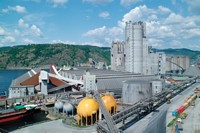Advertisement
Grab your lab coat. Let's get started
Welcome!
Welcome!
Create an account below to get 6 C&EN articles per month, receive newsletters and more - all free.
It seems this is your first time logging in online. Please enter the following information to continue.
As an ACS member you automatically get access to this site. All we need is few more details to create your reading experience.
Not you? Sign in with a different account.
Not you? Sign in with a different account.
ERROR 1
ERROR 1
ERROR 2
ERROR 2
ERROR 2
ERROR 2
ERROR 2
Password and Confirm password must match.
If you have an ACS member number, please enter it here so we can link this account to your membership. (optional)
ERROR 2
ACS values your privacy. By submitting your information, you are gaining access to C&EN and subscribing to our weekly newsletter. We use the information you provide to make your reading experience better, and we will never sell your data to third party members.
Environment
Natural Gas Dispute Is Settled, But Questions Remain
Agreement enables Ukraine to stem rise in natural gas prices
by Patricia Short
January 4, 2006
| A version of this story appeared in
Volume 84, Issue 2
Energy officials from Russia and Ukraine on Jan. 4 settled a dispute that had prompted Russia's largest natural gas supplier, Gazprom, to shut off shipments of fuel to Ukraine.
The dispute certainly disrupted the supply of natural gas in Ukraine. It also caused serious shortages in countries in Central and Western Europe because pipelines carrying natural gas to those areas traverse Ukraine. Although the disruption was short-lived, it has caused a spate of European rethinking about the security of the energy supply.
Russia supplies a quarter of Western Europe's natural gas, and 80% of that supply travels through the Ukrainian pipeline. Other pipelines serve the region as well; a new one, scheduled for 2010, will be built jointly by Gazprom, which is controlled by the Russian government, and Wintershall, the oil and gas subsidiary of BASF.
At the heart of the Ukrainian dispute was Gazprom's decision to more than quadruple its price to the former Soviet Union member. The move was widely seen as a decision by Russian President Vladimir Putin to punish the West-leaning Ukrainian government, although Gazprom officials insisted the change was to bring the gas price to global levels. The price would have risen to $230 per 1,000 m3 from $50.
Other Russian allies, including Belarus, continue to pay at the low level. Even the Baltic countries Latvia, Lithuania, and Estonia—former U.S.S.R. member countries but now members of the European Union—are charged $110 per 1,000 m3. In the new agreement, Ukraine will pay $95 per 1,000 m3.



Join the conversation
Contact the reporter
Submit a Letter to the Editor for publication
Engage with us on Twitter